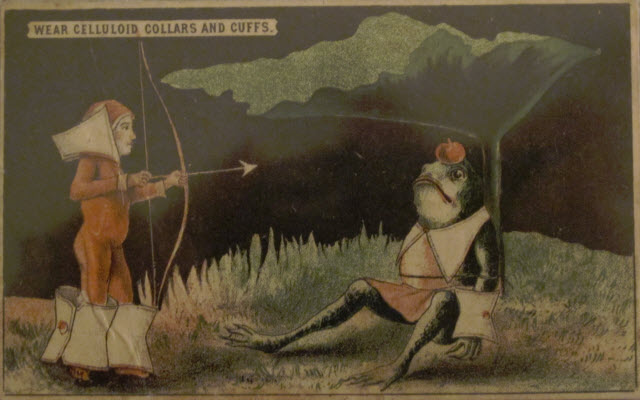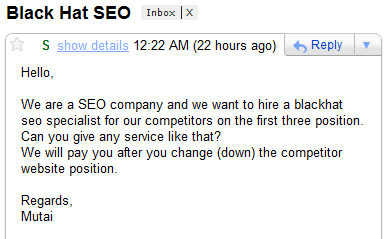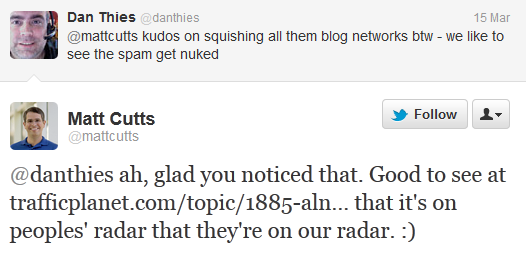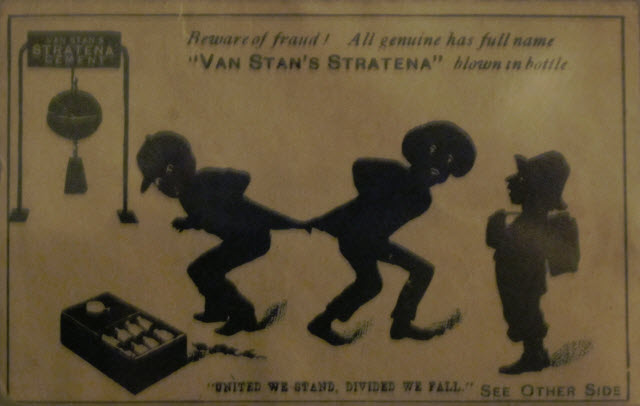Excessive Complexity & Unintended Consequences
Sergey Brin recently said:
You have to play by their rules, which are really restrictive. The kind of environment that we developed Google in, the reason that we were able to develop a search engine, is the web was so open. Once you get too many rules, that will stifle innovation.
He was talking about Facebook, but those words are far more applicable to Google.
A Social Experiment
In the movie Dark Knight the Joker ran a social experiment where he offered 2 boats full of people the opportunity to save their own lives by blowing up the other boat. The boat full of "criminals" threw the button overboard & the other boat also decided not to push the button.

Of course taking someone's life is more extreme than taking their livelihood, but if you do the latter it might create stress and/or other issues which in effect lead to the former. Some people who see their income disappear might have a heart attack, others might have marriages that soon falls apart, leading into a spiral of depression and substance abuse & eventually suicide. Others still might have employees that get laid off & end up heading down some of the same scary paths - through no fault of their own.
Negative SEO Goes Mainstream
Anyone who outs or link bombs smaller businesses (small enough that Google punishing them destroys their livelihood rather than just giving them a bad quarter) is a _______. Anyone who advocates outing or link bombing such businesses is an even larger _______.
Why?
With all of Google's warning messages about abnormal links they have built the negative SEO industry in a big way. In some instances those who are not good enough to compete try to harm competitors. I received emails & support tickets like the following one for years and years...

...but the rate of demand increase for such "services" has been sharp this year. Every additional warning message from Google creates additional incremental demand.
And this is where outing a competitor makes one a total and complete _______ of a human being.
A Recent (& Very Public) Example of Negative SEO
Dan Thies mentioned that it was "about time" that Google started hitting some of the splog link networks.

Anyone who knows the tiniest bit about the social sciences could predict what came next.

In response to his Tweet, someone signed his site up for some splog links & Scrapebox action. Now he is getting warnings about his unnatural link profile. Dan didn't intentionally violate Google's guidelines, but he became a convenient target:
15th March - Dan Thies posts smug tweets to Matt Cutts and pisses off the entire internet.
18th March - seofaststart.com - blog posts started - anchor text "seo" "seo service" and "seo book"
22th March - seofaststart.com - 1 million scrapebox blast started - 100% anchor text "Dan Thies"
26th March - Dan Thies posts in Twitter that he has received an unnatural links message.
Since then Dan has installed a new template & his rankings tanked. Is it the template or the spam links? Probably the spam links, given how many other sites have got hit for using too much focused anchor text.
- Will the site stay tanked? If so, now Google's approach to anchor text & link spikes allows independent websites to get torched in a few weeks for a few Dollars.
- Or will the site come back stronger than ever with the help of the spam links? If it does, then how long is it before people start accidentally spam blasting their own websites & posting a public case study about burning a competitor on a forum, then citing that forum thread in their reconsideration request?
- If the site quickly comes back, will that be due to a manual intervention by a search engineer, or from an algorithm more advanced than some people are giving it credit for being?
When asking such questions one quickly arrives at another set of questions. Is it the web that is broken? Or is it Google's editorial approach that is broken? If the observer breaks the system they observe, then the observer is the problem.
The Bigger Issue
The bigger issue isn't the short term trends for SEO related keywords or Dan's site (he will be fine & rankings are not that important for sites about SEO), but the big issue is that if this can happen to a decade old website then this can happen to literally anybody.
Piss off a ...
- competitor
- SEO
- web designer
- web developer
- business partner
- blogger
- blog reader
- former customer
- freetard
- ex-friend
- bitter family member
- insert any classification or category you like
- etc.
... and risk getting torched.
When you out someone for shady links, you can't be certain they were responsible for it. They could have had a falling out with a consultant or business partner or another competitor who wanted to hose them. Or their SEO or webmaster could have been non-transparent with them.
Then you out them & they might be toast.
White Hat, Black Hat & ________ Hat SEO
Any of the ________ who promote competitor smoking or competitor outing as somehow being "ethical" or "white hat" never bother to explain what happens to YOU when someone else does that to you.

Sketchy marketers can make just about anything look good at first glance. No matter how shiny the package in concept, it is hard to appreciate the pain until you are the one undergoing it.

Building things up is typically far more profitable than tearing things down & if SEOs go after each other then the only winner is Google. Literally every other participant in the ecosystem has higher risk, higher costs & is taxed by the additional uncertainty. Sure some of the conscripts might get a bit of revenues and some of the "white hat" hacks might gain incremental short term exposure, but as the marrow is scraped out of the bone, they too will fall hard.

Google is betting that the SEO industry is full of ________. If our trade is to worth being in, I hope Google is wrong! If not, you will soon see most of the quality professionals in our trade go underground, while only the hacks who misinform people & are an unofficial extension of Google's public relations team remain publicly visible.
That might be Google's goal.
Will they be successful at it?
That depends entirely on how intelligent members of the SEO industry are.


